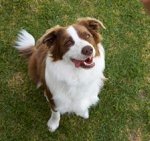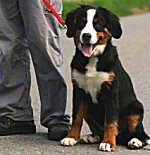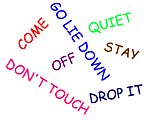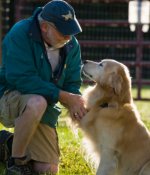Japanese Chin: What's Good About 'Em, What's Bad About 'Em
Japanese Chin temperament, personality, training, behavior, pros and cons, advice, and information, by Michele Welton, Dog Trainer, Behavioral Consultant, Author of 15 Dog Books
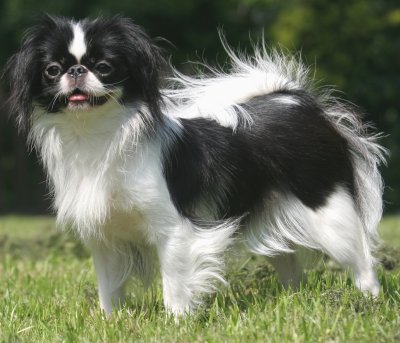
Perky, proud, and playful, the elegant Japanese Chin is less hyperactive and less yappy than many other toy breeds.
Though he does love to play in the yard, he doesn't need much more exercise than that. The yard must be fenced, for he has a spaniel heritage with just enough hunting instincts to chase birds or butterflies into the street.
A lover of comfort, the Japanese Chin enjoys cuddling on laps and snuggling into soft pillows, his soulful eyes inviting pampering, which he accepts graciously. However, you're just as apt to find him perched high on the back of the sofa, for he is an agile climber, light and graceful on his feet, much like a cat.
This gentle yet merry breed insists on attention and interaction and is a terrific pet for senior citizens. At the other end of the spectrum, he is easily overwhelmed by small children and cannot take rough handling or mischief.
Most Japanese Chin are polite with strangers, though a good many individuals are standoffish or timid, so socialization is important. This breed is peaceful with other pets.
Though he has an aristocratic demeanor and definite likes and dislikes, the Japanese Chin is also bright, sensitive, and responsive. The little obedience training he needs will go well if you rely on consistency, praise, food rewards, and gentle corrections.
If you want a dog who...
- Is small with a short face, large expressive eyes, and a lovely feathered coat
- Is perky and playful
- Adores comfort, cuddling, and snuggling
- Doesn't need much exercise
- Is polite with strangers
- Is peaceful with other pets
A Japanese Chin may be right for you.
If you don't want to deal with...
- The fragility of toy breeds (see full decription below)
- A dependent personality that must have companionship most of the day to avoid "separation anxiety" and destructiveness
- Timidity or suspiciousness in some lines, or when not socialized enough
- Regular brushing and combing
- Moderate to heavy shedding
- Health problems associated with their unnaturally short face
A Japanese Chin may not be right for you.
 |
Dog Breed Traits – Which Traits Are Right For You? In this brand new series, I'll help you decide which dog breed traits would best suit you and your family, your home and yard, and your lifestyle, so you can choose the best dog breed for your family. |
Keep in mind that the inheritance of temperament is less predictable than the inheritance of physical traits such as size or shedding. Temperament and behavior are also shaped by raising and training.
FREE eBooks by Michele Welton
![]() "Respect Training for Puppies" and "Teach Your Dog 100 English Words" are free step by step guides to teaching your pup to be calm and well-behaved.
"Respect Training for Puppies" and "Teach Your Dog 100 English Words" are free step by step guides to teaching your pup to be calm and well-behaved.
![]() "11 Things You Must Do Right To Keep Your Dog Healthy and Happy" is a free guide to keeping your dog mentally, physically, and emotionally happy and healthy so you can enjoy a longer lifetime of companionship.
"11 Things You Must Do Right To Keep Your Dog Healthy and Happy" is a free guide to keeping your dog mentally, physically, and emotionally happy and healthy so you can enjoy a longer lifetime of companionship.

- You can avoid some negative traits by choosing an ADULT dog from an animal shelter or rescue group. With an adult dog, you can easily see what you're getting, and plenty of adult Japanese Chin have already proven themselves not to have negative characteristics.
- If you want a puppy, you can avoid some negative traits by choosing the right breeder and the right puppy.
More traits and characteristics of the Japanese Chin
If I was considering a Japanese Chin, I would be most concerned about...
- Fragility. Too many people acquire a toy breed puppy without understanding how incredibly fragile a toy breed is. You can seriously injure or kill a Japanese Chin puppy by stepping on him or by sitting on him when he's curled under a blanket or pillow, where he frequently likes to sleep. And Japanese Chin puppies can seriously injure or kill THEMSELVES by leaping from your arms or off the back of your sofa. Owning a toy breed means constant supervision and surveillance of what's going on around your small dog. Japanese Chins must always be kept indoors, in a safely fenced yard, or on-leash. They are just too easy to injure when not under your complete control.
If you have small children, I do not recommend Japanese Chin puppies, no matter how well-meaning the child. Small children cannot help being clumsy, and that a child meant well is little solace to a Japanese Chin puppy who has been accidentally stepped on, sat on, rolled on, squeezed, or dropped onto the patio. Even Japanese Chin adults may feel overwhelmed by the loud voices and quick movements that children can't help making – and stress and shyness may be the result.
- Separation anxiety. More than most other breeds, Japanese Chins need a great deal of companionship and do not like being left alone for more than a few hours. They become anxious, which they express through destructive chewing and barking.
- Providing enough socialization. Japanese Chin are usually standoffish with strangers. They need extensive exposure to people and to unusual sights and sounds so that their natural caution doesn't become suspiciousness or shyness. Teaching your Chin how to be confident with the world is essential. Follow my free online training programs.
- Grooming and shedding. To keep their silky coat short and free of mats, Japanese Chins require regular brushing and combing, and occasional trimming. Shedding is on the high side of average.
- Health problems. Unfortunately, breeders deliberately breed these dogs to be deformed, with a short face and domed head. As such, they suffer more than their share of health problems – not only with their labored breathing, but also eye problems. Read more about Japanese Chin Health.
My best-selling books – now available FREE on my website
 Respect Training For Puppies: 30 seconds to a calm, polite, well-behaved puppy is for puppies 2 to 18 months old. Your puppy will learn the 21 skills that all family dogs need to know. Click here to read for free.
Respect Training For Puppies: 30 seconds to a calm, polite, well-behaved puppy is for puppies 2 to 18 months old. Your puppy will learn the 21 skills that all family dogs need to know. Click here to read for free. Teach Your Dog 100 English Words is a unique Vocabulary and Respect Training Program that will teach your adult dog to listen to you and do what you say. Click here to read for free.
Teach Your Dog 100 English Words is a unique Vocabulary and Respect Training Program that will teach your adult dog to listen to you and do what you say. Click here to read for free. 11 Things You Must Do Right To Keep Your Dog Healthy and Happy helps your dog live a longer, healthier life. Get my honest advice about all 11 Things before you bring home your new puppy, because some mistakes with early health care cannot be undone. Click here to read for free.
11 Things You Must Do Right To Keep Your Dog Healthy and Happy helps your dog live a longer, healthier life. Get my honest advice about all 11 Things before you bring home your new puppy, because some mistakes with early health care cannot be undone. Click here to read for free.Related posts you might enjoy



